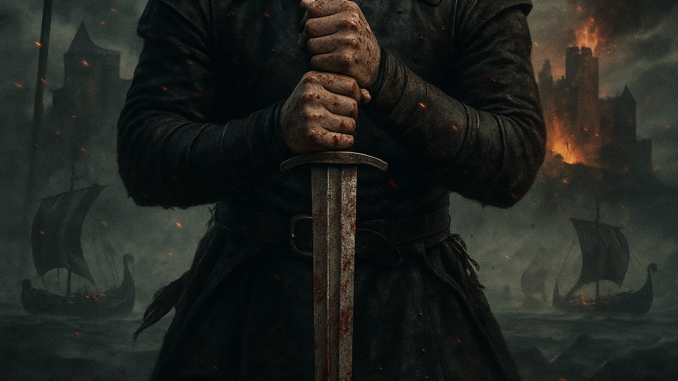
In the golden age of television, The Last Kingdom emerges not just as another medieval tale but as a narrative powerhouse that reimagines history through the eyes of a man torn between two worlds. Based on Bernard Cornwell’s acclaimed The Saxon Stories, the series brings to life the brutal beauty of 9th and 10th-century England with stunning accuracy and gripping storytelling. At its heart is Uhtred of Bebbanburg, a character so layered and compelling that he redefines what it means to be a hero in historical fiction.
From the very first episode, The Last Kingdom seizes attention with its raw and unflinching portrayal of the Viking invasions of Anglo-Saxon England. The show doesn’t shy away from bloodshed or betrayal but uses them as mirrors reflecting the chaos of a divided land. The historical setting isn’t just a backdrop; it’s a living, breathing force that shapes every character’s destiny. With detailed costumes, authentic language tones, and a hauntingly atmospheric score, the series pulls viewers into a time where survival often came at the cost of loyalty.Uhtred, born a Saxon but raised by Danes, embodies the cultural conflict of the era. His journey is not just physical but deeply emotional, as he constantly battles questions of identity, honor, and allegiance. This inner turmoil adds a rare depth to a genre often dominated by straightforward war heroes. He is at once brave and reckless, noble and flawed — a warrior whose sword is as sharp as his sense of justice. His struggle to reclaim Bebbanburg becomes more than a personal quest; it symbolizes a fight for belonging in a world where borders are drawn with blood.What sets The Last Kingdom apart is its refusal to present a binary world of good versus evil. The Danes are not mere savages, and the Saxons are far from saints. The show revels in shades of gray, challenging viewers to empathize with every side. Even the most brutal characters are given moments of humanity, making the series a masterclass in nuanced storytelling. In a world where religion and politics often intertwine, The Last Kingdom dares to ask: what truly makes a man righteous?Female characters, too, are not sidelined in this male-dominated narrative. From the cunning Aethelflaed to the fierce Brida, women in The Last Kingdom command respect, wield influence, and shape the course of history in their own right. Their strength lies not just in swordsmanship but in their resilience and intelligence. The show gives them agency in a time when they were often considered mere pawns in political games.A remarkable aspect of the series is its faithfulness to historical events while weaving fiction seamlessly. While Uhtred may be a fictional character, many real-life figures — Alfred the Great, Aethelred, Edward — are portrayed with impressive accuracy. The show’s creators balance entertainment with education, introducing viewers to the complexities of early English unification without resorting to dull exposition. It’s history told with a pulse.The cinematography in The Last Kingdom deserves its own praise. Whether it’s the mist-covered battlegrounds, the grand halls of Wessex, or the haunting landscapes of Northumbria, every frame is meticulously crafted. The use of natural lighting and practical effects adds authenticity, immersing viewers in the grit and glory of medieval life. It’s not just what the characters say or do — it’s how the world around them breathes and burns.Character development is a cornerstone of the series. Watching Uhtred grow from a vengeful child to a wise, battle-hardened leader is deeply satisfying. Supporting characters like Finan, Sihtric, and Father Beocca evolve in meaningful ways, each carrying their own emotional arcs. These relationships give the show its heart — reminding us that even in war, bonds of friendship and loyalty matter just as much as strategy and strength.The show also doesn’t shy away from the emotional cost of violence. Deaths are not glamorized; they sting with consequence. The loss of loved ones, betrayals by allies, and sacrifices for the greater good add layers of tragedy and realism. It’s a show where victories come with a price, and every battle scar carries a story.The Last Kingdom also explores the power of faith. The tension between pagan beliefs and Christianity is a recurring theme, influencing politics, personal relationships, and even war tactics. King Alfred’s vision of a united England under one God often clashes with Uhtred’s pagan roots, creating a spiritual tug-of-war that’s as compelling as any sword fight.As the series progresses, it becomes clear that The Last Kingdom is not just about reclaiming land or crowns. It’s about reclaiming identity, dignity, and a place in a fractured world. Uhtred’s final decisions echo the complexity of his life — not driven by pride or vengeance, but by purpose and peace. It’s a fitting arc for a man who has lived between worlds and learned to forge his own path.In the end, The Last Kingdom leaves behind more than an epic tale of battles and kings. It offers a powerful commentary on legacy — the kind we build, the kind we inherit, and the kind we choose to redefine. As the final credits roll, one can’t help but whisper, “Destiny is all.” But in Uhtred’s case, destiny is not just accepted — it is earned.

Leave a Reply